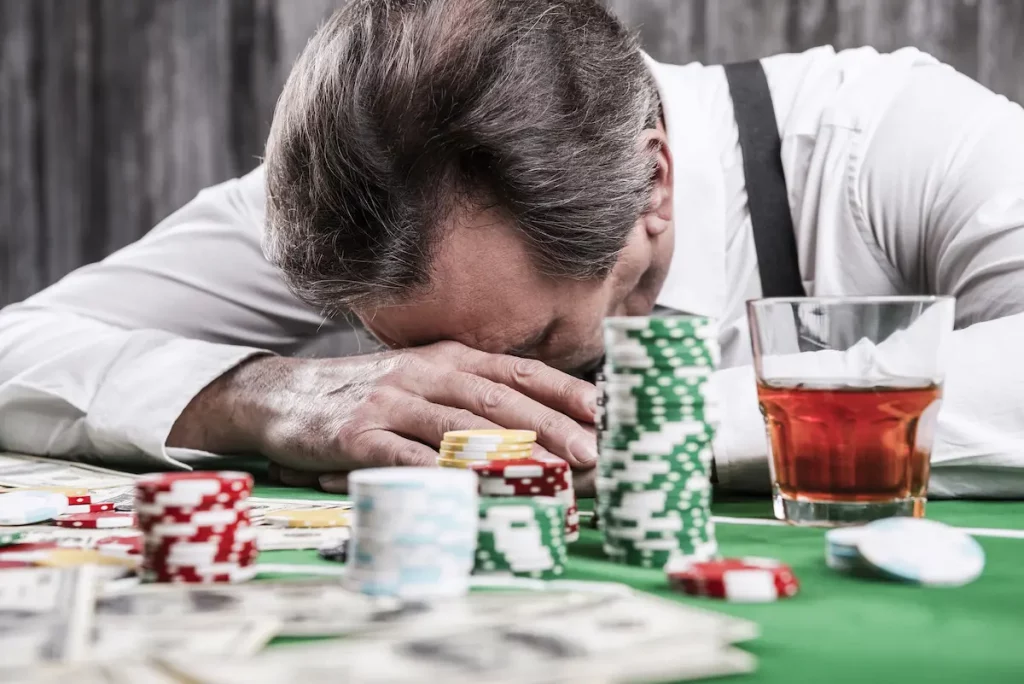Wondering if you should divorce your gambling husband? No, you do not have to divorce your gambling husband (or partner), but you must remove all financial control from them. A gambling addiction needs timely professional intervention. You cannot make your husband change, and if he doesn’t seek help, you must do whatever it takes to protect yourself from his reckless spending.
Like any other addiction, compulsive gambling can have devastating effects on relationships. It is often a hidden vice and the true extent of the problem may, unfortunately, only become evident after significant debt has been incurred. If your husband (or wife) is addicted to gambling, you have every right to be deeply concerned and must take action as quickly as possible.
If you have a gambling-addicted husband, you are in a challenging situation. You will need to make some difficult decisions to navigate the rough waters ahead. Let’s explore this topic so you can make the best decision for yourself, your family, and your husband.

Related Reading: Divorce Because Of Video Games?
Resources for further or immediate assistance related to problem gambling:
National Problem Gambling Helpline – 1-800-522-4700
Gambling Addiction Hotline – 1-844-779-2637
Should I Divorce My Gambling Husband?
Gambling addiction is often difficult to understand by those who haven’t been personally affected. It may seem like a harmless recreational activity from the outside, but when the thrill of betting becomes a need, it can be debilitating, not only for the addict but also for their family. The effects filter into every aspect of your life; emotional, financial, and social.
Living with a gambling addict spouse may at times feel like you are living with two entirely different people. He may seem reasonable and able to function normally most of the time but act irresponsibly whenever he has the opportunity (or available funds) to gamble. This can make the decision of whether to leave or stay and try to help much more difficult.
If your husband has a gambling addiction, you may be confused about what to do. You feel the pressure of your dwindling finances, but at the same time, you may feel guilty thinking about divorcing him. You want to be a supportive partner that will help your spouse through thick and thin, but compulsive gambling is an insidious, festering problem that you know will only get worse.
Gambling disorder is precisely what its name implies, and it is not going to get better just by reasoning with your husband or trying to make him see the implications of the problem. The mental high that he obtains each time he wins, no matter how small, stimulates the brain to want to repeat the process. So, the cycle continues, over and over again.
While each home situation and relationship are unique, the one thing that the wife or husband of a husband with a gambling addiction needs to do is take complete control of the finances. If he hasn’t already done so, your husband could quickly burn through your joint savings, amass credit card debt, or even risk your home.
One of the most challenging factors when dealing with a gambling addiction is getting your spouse to admit that he has a problem. If you want to support your spouse, the best thing you can do is make the option of seeking professional help available and offering him emotional support while he seeks help.
Until he is ready to seek help, there is nothing you will be able to do to change the situation with your husband positively, so let go of any guilt that you may be carrying and focus on taking care of yourself and any children you share.
Open your own bank accounts and move the mortgage to your name only, if you can. Your husband may become defensive and angry as he anxiously pushes back when he feels his resource lifelines being cut off. This isn’t easy to cope with, but this is not an area you can negotiate about.
How Do I Know If My Husband Has a Gambling Addiction?
You may suspect a problem or notice irregularities in your finances, but many spouses struggle to know exactly when a little recreational gambling has shifted to a problematic addiction. One of the most insidious problems is the fact that the gambler is often unwilling to admit that they have a problem and will go to any lengths to justify (or hide) their behavior.
Unfortunately, one no longer has to spend hours in a casino or hang out at sports bars to gamble. These activities have become much more accessible and online gambling has made it possible to play huge amounts of money, from the comfort of your own home.
When you are wondering what to do and whether or not you should separate from or divorce your gambling husband, you might find yourself swaying back and forth about whether there is really a problem or if you are exaggerating the situation. Throughout the uncertainty of whether or not you are doing the right thing, look out for the signs and symptoms of compulsive gambling.
Signs Of Compulsive Gambling
It’s not always easy to diagnose the signs as gambling addicts try to hide the problem. If you suspect that your husband is addicted to gambling, but you just can’t put your finger on it, look out for the following symptoms:
- Lying about gambling. You know that they have been gambling, but they deny the activity.
- Being preoccupied with gambling. Even if you are out with the family, you may notice them on their phones or slipping off to their laptop to place bets.
- Being visibly anxious and showing other signs of distress when they cannot gamble. Many compulsive gamblers start showing signs of emotional withdrawal within 24 hours. This can include irritability, depression, anxiety, restlessness, and/or sleep changes.
- Persistent gambling despite the consequences. Even if you have caught your husband overspending and confronted him, he continues to gamble.
- Financial difficulties. Gamblers need money to play, and once their addiction takes hold, they often find themselves in financial trouble. This gets them into difficulty, and they may borrow money from friends, colleagues, and family, or even start taking loans to feed the habit. They may even resort to stealing or pawning household items or jewelry to get money.
- Being defensive. Gambling addiction is a progressive disorder, and in many cases, a person won’t look for help because they still feel like they are in control or the ‘next big win’ will solve everything. To be ready to accept help for the addiction, your husband would need to be able to talk about the issue without becoming defensive or getting upset.
- Being remorseful but unable to stop. After a loss, gamblers may have a period of remorse as they realize the impact of their actions. Your husband may cry remorsefully or beg your forgiveness and understanding. However, despite this brief time of clarity, if you find him gambling again, you know he is addicted.
Will I Share Husbands Gambling Debt When We Divorce?
In a divorce, assets, and debts created during the marriage are split. This is one of the biggest concerns for the wife of a gambler. You may have realized for a long time that your husband is spending money that you don’t have, maxing out credit cards, or even applying for loans that you aren’t aware of.
When you begin divorce proceedings, collect every bit of paperwork. You will need to prove the dissipation of assets. This means your husband’s gambling may be considered reckless spending of marital money. If you have all your paperwork in place and can show that money was spent wastefully, your legal representative will be able to request unequal distribution of the marital assets (and debts).
That way, you may not have to carry your husband’s gambling debts out of the marriage with you. It is essential to collect as much detail as you can about expenses, credit cards, annuities, tax returns, investments, and anything else that can be used to show wasteful spending.
Related Reading: Is It Normal For My Husband to Go On Vacation Without Me?
Conclusion
If your husband is gambling too much, you may feel trapped inside a situation that is spiraling out of control. If you want to stay in the marriage, he must seek professional treatment for the addiction, but he will likely only be receptive to change if he has admitted the problem and agreed to seek help.
The most essential thing for any wife when she realizes that her husband has a gambling addiction is to immediately take complete control of the finances and do everything possible to protect herself financially.

